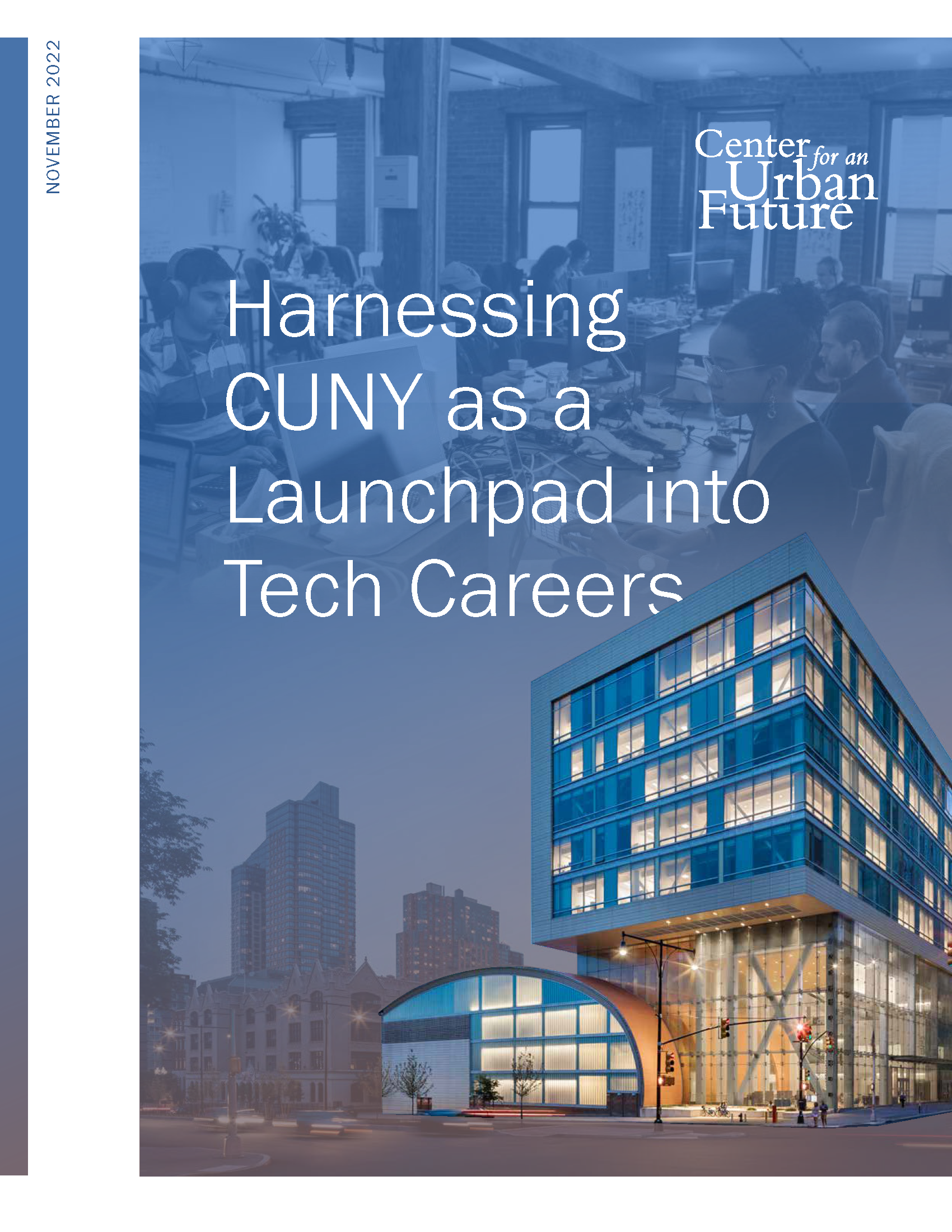Testimony of Dorian Block
Senior Editor, Center for an Urban Future
Before the New York City Council Committees on Finance and Higher Education
on New York City’s Budget Allocation for the City University of New York
March 18, 2024
Good morning. I’m Dorian Block, senior editor at the Center for an Urban Future, an independent think tank focused on creating a stronger and more inclusive economy in New York. I’m testifying today on behalf of CUF’s editorial and policy director, Eli Dvorkin. Thank you to Chairs Brannan and Dinowitz and members of the committees for the opportunity.
To help more New Yorkers get ahead in today’s fast-changing economy, there are few investments more worthwhile than boosting college and career success initiatives at the City University of New York (CUNY).
In recent years, the Center for an Urban Future has published several reports focused on what policymakers can do to strengthen CUNY’s vital role as a springboard to economic mobility. Our recent research proposed the creation of CUNY Reconnect, a first-of-its-kind, major return-to-college initiative that has already re-enrolled more than 26,000 working-age adults at CUNY who had not finished their degrees. We’ve also published reports on harnessing CUNY as a launchpad into technology-powered careers; scaling up the highly effective CUNY ACE program to boost senior college success; and growing the innovative CUNY 2X Tech initiative, which helped spark a $10 million, five-campus expansion late last year.
Investing in CUNY isn’t just a win for students, it’s vital for the economic security of New York City and State. Yet today, CUNY finds itself at a financial crossroads, as steep budget cuts threaten the programs that are most effective at helping students earn a degree. CUNY faces a cut of more than $85.8 million in city funds in the Mayor’s preliminary budget, compared to last year's adopted budget. Reversing these cuts will be essential if the city is to continue making progress toward a more equitable economy.
We strongly encourage the Council to fully fund CUNY in the FY 2025 budget. In addition, we recommend four key areas where these investments can have the greatest impact:
1. Renewing the highly successful CUNY Reconnect initiative.
Nearly 700,000 working-age New Yorkers have obtained some college credits but no degree. In just two years, the CUNY Reconnect initiative, thanks to the tremendous commitment of Speaker Adams and the City Council, has helped more than 26,000 students return to college and re-enroll, of which over 1,900 have earned degrees. The majority of these students are Black and Hispanic, and women, and most are over the age of 24. At a relatively modest cost of just $5.4 million last year, CUNY Reconnect has succeeded in helping working-age New Yorkers complete credentials while boosting enrollment, and this program deserves to continue and grow.
2. Expanding CUNY ACE to help more senior college students succeed.
At a time when a college credential has become increasingly critical to accessing well-paying jobs, but when far too many of those entering CUNY’s four-year schools are leaving without a degree, the City Council should look to scale up the CUNY Accelerate, Complete, and Engage (ACE) program. Today, only 36.2 percent of full-time students at CUNY’s senior colleges graduate in four years. For Black and Latinx students, the graduation rate falls to 27.5 percent. Fortunately, the ACE program has begun to change this, providing students attending CUNY’s senior colleges with a mix of academic advisement, career development, tuition scholarships, textbooks, and transportation assistance that has proven to be critical in boosting graduation rates—by as much as 40 percent. However, limited funding has restricted that program to serving just 3 percent of all eligible students. We urge the Council to invest in growing CUNY ACE, which will help students save money by completing their degrees more quickly, maximize the city’s other investments in student success by boosting completion rates, and strengthening New York’s economy by raising earnings and growing the tax base.
3. Boosting CUNY's career success programs.
Although programs like CUNY ACE and ASAP have made meaningful progress in boosting graduation rates, CUNY still has work to do to ensure that CUNY degrees lead to lasting economic opportunity. Today, too many students end up unemployed or underemployed even after earning a credential. Fortunately, several CUNY programs are succeeding in launching students into well-paying careers in the tech sector, health care, finance, and other industries. But these programs are generally operating at a very small scale, and budget cuts threaten their continuation. To ensure that CUNY is as effective as possible in generating economic mobility, the City Council should support the growth of these initiatives—such as the Tech in Residence Corps and the Tech Talent Pipeline Residency Internship program, Futures in Finance, and CUNY Career Launch—and help expand access to career services.
4. Strengthening the crucial CITE program so that every future teacher can be trained in computing education.
Nearly one-third of new teachers hired by New York City Public Schools each year graduate from CUNY. At the same time, fewer than 5 percent of all new teachers are prepared to teach computational thinking—the ability to ask questions, organize data, and solve problems with computers. This training gap is preventing many students in New York City public schools—in particular, Black and Hispanic students, low-income students, and girls—from receiving early encouragement in computing education and from pursuing computer science in high school, college, and careers. To help close these equity gaps, the City Council should invest in CUNY’s promising Computing Integrated Teacher Education (CITE) program, which trains future teachers to use computing concepts in all subjects and at every grade level. With the Council’s support, this program can expand to reach all 11,000 aspiring teachers enrolled at CUNY every year.
New York’s elected leaders are nearly unanimous in expressing the desire to expand economic mobility, while ensuring New Yorkers are ready for the well-paying jobs the city’s economy is creating and making the state’s tax base more resilient. No institution is better positioned to deliver on those needs than CUNY. Now is the time to invest in CUNY’s effectiveness, not limit its potential.
Thank you for the opportunity to testify today.








